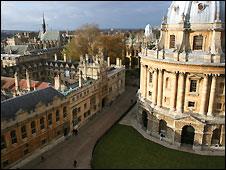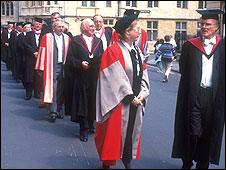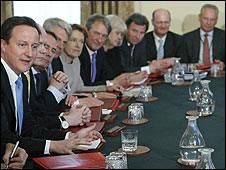Top universities 'are failing to widen intake'
- Published
Young people from poorer backgrounds are still struggling to get into top universities, says the agency in charge of widening access to higher education.
The wealthiest 20% of youngsters are seven times more likely than the most disadvantaged 40% to get places at England's most selective universities.
The Office for Fair Access (Offa) says there has been no significant change since the mid-1990s.
This "weak point" must improve, says Universities Minister David Willetts.
The report from Offa considers how to widen accss to the top universities.
Tuition fees
Sir Martin Harris, director of Offa, says that bright disadvantaged youngsters need to be identified and supported at an earlier age.
This should happen before the age of 14 when pupils are making their decisions about GCSE options, he says.

Oxford says it already spends £3m in outreach projects
"Right at the heart of the matter is the need to ensure that those young people with the potential to succeed in a research-intensive university, but who do not currently choose to apply, are identified as early as possible," says Sir Martin.
Offa was set up to protect access to university for poorer students when tuition fees were increased four years ago.
It is now submitting a report to the review of university funding chaired by Lord Browne, which could recommend a further increase in fees.
The report says that while more students from poorer families are getting into university, there remains much less progress in the most sought-after university courses.
Access from the 40% least disadvantaged youngsters has been "almost flat since the mid-1990s".
Underachievement
Talented youngsters from disadvantaged backgrounds are still failing to realise their potential, says the report.

The Russell Group of leading universities wants to raise tuition fees
It identifies a series of reasons causing this underachievement.
Poorer youngsters are more likely to underperform in exams than their better-off counterparts, which means they might miss out on the grades needed for the most competitive courses.
They are also at greater risk of making bad decisions over GCSE choices, which could limit their chances.
And even if they have the exam grades in the right subjects, poorer youngsters are less likely to apply to the top universities.
Sir Martin wants leading universities to make greater efforts to give advice and guidance to potential applicants.
He says there should also be more information about the financial support available, to reduce fears over student debt.
Independent schools
Facing such challenges over social exclusivity, the top universities have argued that they can only offer places to the best candidates who apply.

More than two-thirds of the new cabinet are Oxbridge graduates
Oxford University, responding to the Offa report, says it spends £3m a year on outreach projects and a further £6m on bursaries.
But it highlights how independent school pupils are so over-represented in the top grades - accounting for almost a third of pupils achieving three grade As at A-level.
Mike Nicholson, in charge of undergraduate admissions at Oxford, says that it is inequality of opportunity at school age that "is one of the major barriers to progression".
"This is why support for students early on in their educational careers is vital: government, schools, universities and parents all have to work together to achieve social mobility," he says.
A report from the Sutton Trust last month claimed that social mobility was lagging behind in England - and children's achievement was more linked to their family background than in many other countries.
Earlier this week, the Russell Group of leading universities submitted proposals to Lord Browne's review which called for a lifting of the current £3,225 limit on fees.
This could mean the most prestigious courses charging much more, as a market develops in university charges.
Students have complained that "mortgage-style debts" would mean young people choosing courses on price rather than their own ability.
There were also questions raised about the narrowness of the educational background of the new Conservative-Liberal Democrat cabinet - with two thirds having gone to Oxford or Cambridge.
Mr Willetts says: "The report recognises the importance of attracting a wider group of people applying to very selective universities and courses.
"Wider and more flexible progression routes from colleges and apprenticeships to universities will be an important part of this agenda. This is one of the weak points of the English education system and we are committed to improving it."
- Published17 May 2010